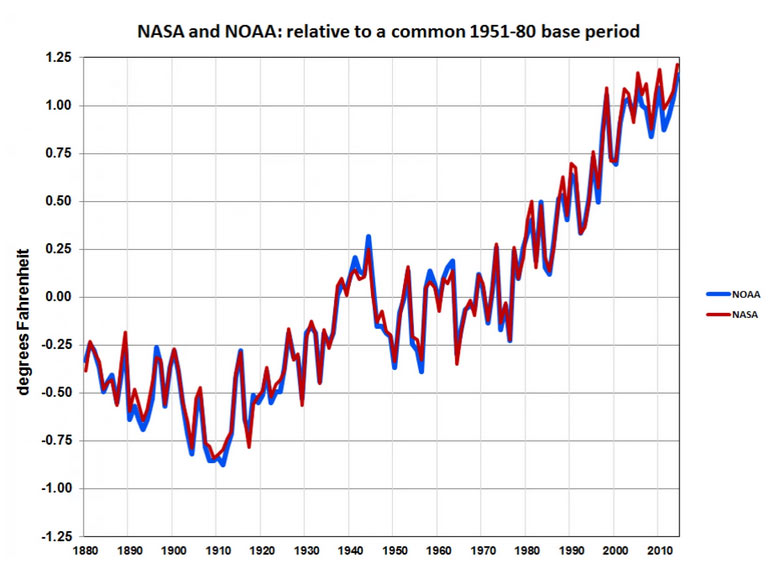Last week, in an announcement that not only drew massive media attention but was seized upon by President Obama in his State of the Union address, NASA and NOAA jointly declared that 2014 was the hottest year ever recorded, based on temperature records that go back to the year 1880.
The news came out on Friday morning. It was announced through press releases by the agencies, but also through more thorough discussions for the public and media, including this PowerPoint presentation and a media briefing discussing it.
Why revisit all of this? Because since the announcement there has been a strong reaction, and a lot of climate “skeptics” have suggested that really, 2014 might not have been the hottest year after all. Consider, for instance, this article in the UK’s Daily Mail, whose first sentence reads, “The Nasa climate scientists who claimed 2014 set a new record for global warmth last night admitted they were only 38 per cent sure this was true.”
Given the stakes here — this is the biggest news story about climate change in quite some time — I think it is important to examine this charge. For further discussion of the matter, by the way, you should also see this post by Andrew Revkin at the New York Times and this one by Andrew Freedman at Mashable.
So what’s up with this 38 percent figure, and does it really undermine the idea that 2014 was the hottest year on record?
The figure comes from slide 5 of the PowerPoint presentation mentioned above, where NASA scientists noted that there was a 38 percent chance that 2014 was the hottest year, but only a 23 percent chance that the honor goes to the next contender, 2010, and a 17 percent chance that it goes to 2005.
The same slide shows that NOAA’s scientists were even more confident in the 2014 record, ranking it as having a 48 percent probability, compared with only an 18 percent chance for 2010 and a 13 percent chance for 2005. Here is the slide:
According to a NASA spokesman, the PowerPoint containing this slide went online at the same time that the 2014 temperature record itself was announced. So it may not have been as prominent as the press releases from the agencies, but it was available.
The slide was also discussed in the press briefing when the news of the new record was released. In the briefing, NOAA’s Thomas Karl, director of the National Climatic Data Center, noted:
Certainly there are uncertainties in putting all this together, all these datasets. But after considering the uncertainties, we have calculated the probability that 2014, versus other years that were relatively warm, were actually the warmest year on record. And the way you can interpret these data tables is, for the NOAA data, 2014 is two and a half times more likely than the second warmest year on record, 2010, to actually be the warmest on record, after consideration of all the data uncertainties that we take into account. And for the NASA data, that number is on the order of about one and a half times more likely than the second warmest year on their records, which again, is 2010. So clearly, 2014 in both our records were the warmest, and there’s a fair bit of confidence that that is indeed the case, even considering data uncertainties.
Karl further noted that the Japan Meteorological Agency had also found2014 to be the hottest year on record.
In light of all of this, is there anything wrong with NASA and NOAA declaring 2014 a record? To the contrary, it’s hard to see how there could be.
If anything, in criticizing NASA, and holding forth the 38 percent figure as though it somehow undermines the analysis, climate “skeptics” are simply exaggerating scientific uncertainty — which always exists and can never be fully dispelled — and letting it undermine what we actually know.
A better scientific way of assessing evidence, in contrast, is to take uncertainty into account — which NASA and NOAA clearly did — but then go with the conclusion that is supported by the weight of existing evidence. And from Karl’s words above, you can clearly see that the weight of the evidence, supported by both NASA’s and NOAA’s analyses, shows that the most reasonable conclusion is that 2014 is the hottest year on record.
Indeed, NASA’s Gavin Schmidt, who heads up the Goddard Institute for Space Studies (which did the temperature analysis from its records, dubbed “GISTEMP”) and also participated in the press briefing above, has written ablog post to explain all of this further. Here’s what he notes:
In both analyses, the values for 2014 are the warmest, but are statistically close to that of 2010 and 2005. In NOAA analysis, 2014 is a record by about 0.04ºC, while the difference in the GISTEMP record was 0.02ºC. Given the uncertainties, we can estimated the likelihood that this means 2014 was in fact the planet’s warmest year since 1880. Intuitively, the highest ranked year will be the most likely individual year to be the record (in horse racing terms, that would be the favorite) and indeed, we estimated that 2014 is about 1.5 to ~3 times more likely than 2010 to have been the record. In absolute probability terms, NOAA calculated that 2014 was ~48% likely to be the record versus all other years, while for GISTEMP (because of the smaller margin), there is a higher change of uncertainties changing the ranking (~38%). (Contrary to some press reports, this was indeed fully discussed during the briefing).
So taking all of this into account, I can only conclude that once you dig into what NOAA’s and NASA’s scientists actually did, and why they did it, you realize that their conclusion is perfectly reasonable.
2014 was the hottest year on record. Not with absolute certainty — just with enough of it for an imperfect world.
Source: USA Today



